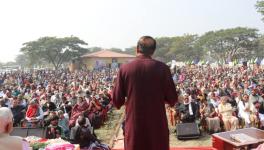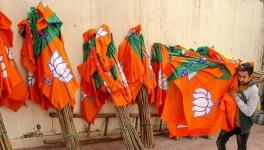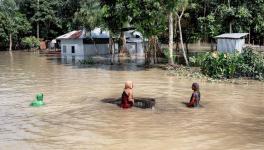Will Strained Relations with Dhaka Snowball Into a Major Worry for India?

President Joe Biden at a pull-aside meeting with Interim Leader of Bangladesh Muhammad Yunus, Tuesday, September 24, 2024, at the U.N. Headquarters in New York City. (Image Credit: Wikimedia Commons/Official White House Photo by Adam Schultz)
Kolkata: A string of recent incidents after the overthrow of the Sheikh Hasina regime in Bangladesh seem to have created fissures in the neighouring country’s ties with India, where the deposed Prime Minister has taken refuge. The latest in the series of such events is the arrest of a Hindu religious leader in Dhaka on sedition charges, with the Indian government expressing “deep concern” and Bangladesh’s interim government responding by saying it was “an internal matter”.
As Indo-Bangla relations have a direct effect on India as well as states, such as West Bengal and Assam, Newsclick spoke with some defence strategists and ex-armed forces persons in Kolkata to understand the gravity of the situation.
Commenting on the crisis in bilateral relations that could snowball into a major worry for India’s relations with Bangladesh, Air Chief Marshal Arup Raha (retd) said the position taken by Bangladesh after the regime change was indeed a “cause for worry” for India, as some “fundamentalists and anti-India elements” had grabbed power there.
Col Raj Sangwan (retd) noted that Bangladesh had been in the UN list of 46 least developing countries (LDCs) since 1975. Due to its economy doing well over the past decade, the United Nations would have taken Bangladesh out of LDC list by November 2026 and it would have graduated to developing nation status.
“But with the regime change in Bangladesh, the situation has resulted in extreme energy (power, gas & coal) and food shortage, resulting in a downslide of its economy and very high inflation of 13%. Moody’s has downgraded its rating from B1 to B2. This downgrading will have investment & borrowing issues detrimental to the country’s economic growth,” he said.
Commenting on the law and order situation there, Sangwan claimed it was going “out of control” under the ‘so-called new democracy”.
“The Hindu (minority) population, temples, etc. are being targeted by radicals,” he said, alleging that even Bangladesh’s Army had been involved in such attacks.
Mohd Yunus, the chief adviser to Dhaka’s interim government has lifted ban on Jamat-e-Islami and released former Prime Minister and Bangladesh National Party leader Khalida Zia from house arrest. “This has further emboldened radicals to perpetrate crimes against Hindus,” he added.
Sangwan accuse the interim government under Yunus of taking “India biased decisions”, such as routing certain exports through the Maldives to West Asia, Europe and the US, which earlier were earlier passing through Indian ports.
The retired Army official also accused the new Bangladesh interim government of cosying up to Pakistan by establishing a direct maritime link and waiving mandatory 100% screening of Pakistan cargo.
“For the first time after the creation of Bangladesh (in 1971), a Pakistani cargo ship from Karachi is docked in Chittagong. This development raises security concerns for India, as in 2004, a large haul of Chinese ammunition brought in through fishing trawlers was seized in Chittagong, reportedly meant for insurgents in Assam,” he alleged.
He further pointed out that Yunus was to conduct elections within three months from time he was installed, “but 100 days have gone by and there are no signs of any election to restore democracy.” In an interview with Al Jazeera, Yunus unwittingly revealed that he is going to be there for at least four years, he pointed out.
However, Sangwan was of the view that the straining of relations with India and Donald Trump coming to power in the US, spelt “big trouble” for Yunus.
Sheikh Hasina, in telephone call to congratulate Trump, had reportedly introduced herself as Prime Minister of Bangladesh as she has not resigned.
Brigadier Debasish Das (retd), too, expressed deep concerns over worsening relations with Bangladesh and rising security concerns for India.
On reports of a Karachi cargo ship directly docking in Chittagong Port, he told NewsClick that this was the ‘first incident of its kind in the past 53 years.”
“Ever since the creation of Bangladesh as a separate nation in 1971, there was no direct delivery of cargo from Pakistan and usually a third country, like Singapore or Sri Lanka, was involved in scanning what materials were coming from Pakistan to Bangladesh. There was an atmosphere of distrust because of the atrocities that happened to their civilian population during the war,” he said.
Das agreed that India had reasons for being worried over this development, as earlier in 2004, a huge consignment of arms, ammunition and explosives were recovered from Chittagong Port, reportedly meant for the insurgents in Assam.
“This can once again encourage non-State players or India's enemies to explore this unchecked route for smuggling weapons, ammunition, narcotics and other contraband items,” he added.
Das said a few other developments in the post-Hasina period in Bangladesh, indicate that there may be an “agenda to erase the liberation legacy of Bangladesh and thus also erase the good memories of India-Bangladesh relations,” adding that the interim government had withdrawn a few public holidays related to the Liberation War and removed the statues and pictures of Sheikh Mujibur Rahman, the father of their nation.
He also cited reports of an influx of people crossing over to India in search of livelihood, apprehending crossovers by “subversive elements”, too.
He alleged that the “shots are now being called by fundamentalist elements/organisations like Jamat, with Yunus seemingly a frontal face to keep international organisations happy.”
Pointing out that it was in India’s interest to have a politically stable and financially sound neighbour, the retired Army officer said “India has adopted a wait and watch policy to see the developments before any reaction or response. Bangladesh seems to be once again at the crossroads of history where the choices they make will either identify them as a developing nation or a lost cause.”
To a question on the chances of Sheikh Hasina’s return to Bangladesh, Das said “as far as politics goes, like cricket, anything can happen. Politics is the art of possibilities and if Nawaz Sharif could return from exile and come to power in Pakistan or Imran khan, the most popular political leader of Pakistan can go to jail, then anything might happen there as well.”
India-Bangladesh trade is currently at almost $13 billion and Pakistan-Bangladesh trade is not even a billion dollars. “So. there is a geopolitical reality and past that current political bosses in Bangladesh cannot just wish away,” he added.
On the question of minorities in Bangladesh, especially Hindus, being targeted and India's “cautious” approach, Das said the internal policy of Bangladesh toward human rights of their own citizens was a matter of concern for the entire civilised world.
“However, India cannot take any military action. The government of India at all levels, including the Prime Minister, has raised its concerns at appropriate international forums. Donald Trump has also strongly condemned such activities,” he said.
On social media calls for trade ban with Bangadesh, Das said trade by itself was an act where both parties benefit and suggestions for such quick fix responses were impractical in today's world.
Noting that India and Bangladesh having a shared history of trust and friendship for the past five decades, he pointed out how the Mukti Bahini and Indian Army had worked side by side. “There is huge people to people connect between the two nations. Hopefully these few incidents will be unsuccessful in tarnishing that,” he added.
Speaking with NewsClick, Maj General PK Mullick, VSM, (retd), alleged that Pakistan, the US and China had ousted Sheikh Hasina.
“In last moment, the Bangladesh Army betrayed Hasina. All radical elements are being let off. This has grave repercussions for India. Organised violence is being conducted by radical element with student faces at the forefront,” he alleged.
Mullick said if Bangladesh imports arms, it cannot go into armed conflict with India, as on three sides it is encircled by India, barring the Burma border for 30 to 40 kilometres.
“What they are doing is posing threat for India,” he said, adding that “Bangladesh doesn’t need submarines. They have imported submarines from China…their only armoured brigade is posted at the ‘chicken’s neck’ of India. We have got enough forces to ward of that threat. The situation is not good now. Radical fanatics will keep provoking, and that must be kept in mind.”
On bilateral trade, Mullick said “India is not dependent on Hilsa (fish) trade. If India stops tomato and onion exports, then they (Bangladesh) will face a grave problem.”
He also felt that Trump’s return to power in the US would see rising pressure on Yunus, who is “backed by radical elements”.
“They (Dhaka) don’t have money in their account. They are begging from IMF and World Bank. Biden is now gone, and IMF runs on the order of the US. Will they get IMF help now?” he added.
Mullick rued that India had a “very good understanding” in intelligence sharing with Bangladesh. “Now, the situation is grave. Against those whom we used collect intelligence are now in power there, which has created problems for India,; he added.
Get the latest reports & analysis with people's perspective on Protests, movements & deep analytical videos, discussions of the current affairs in your Telegram app. Subscribe to NewsClick's Telegram channel & get Real-Time updates on stories, as they get published on our website.
























